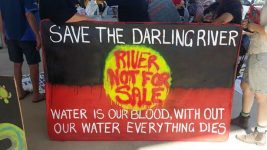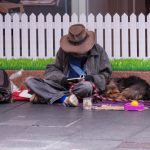Sydney’s Homeless Send Drinking Water to Drought-Stricken NSW Towns

Right now, those living along the Barwon-Darling river system in western NSW are doing it tough, as they’ve been suffering acute water shortages in the drought-stricken region for months. There’s a lack of water fit to drink, to shower in or even give to livestock.
The huge fish kills that occurred along a strip of the Darling River at Menindee in December and January drew national attention to a situation that involves rivers fast running dry and locals with nothing to drink, while cotton farms have adequate supplies and their crops are growing fine.
In the Warrumbungle Shire town of Mendooran, local are now on level 6 restrictions, which means they can only shower for up to three minutes a day, and each household can only wash two loads of clothes a week.
And towns with large First Nations populations are amongst those doing it the toughest. Walgett has been on bore water since the Naomi River ran out. And at Brewarrina, with its two-thirds Aboriginal population, the Barwon-Darling is bone dry.
But, while state politicians have made visits to these areas, they’ve done little to ease the crisis on the ground, so that’s why a group of Sydney’s homeless has taken it upon itself to raise funds and organise truckloads of clean drinking water to be sent out to towns without any.
The source of life
“Last week, we ended up sending a B-double load of water up there,” said Lanz Priestley, spokesperson for Dignity Water. “It was 32,000 litres.” He added that the group had done an initial run involving 11,000 litres back in December.
Run by three Sydney homeless people, Dignity Water has teamed up with the Menindee Water Run, and so far, between them, they’ve recently delivered 54,000 litres to five of the hardest hit towns: Menindee, Wilcannia, White Cliffs, Tilpa and Sunset Strip.
“The towns are absolutely ecstatic. They can actually have a drink without any side effects,” Mr Priestley told Sydney Criminal Lawyers. “We thought, nobody is actually furnishing enough to supply whole towns, so we built up the necessary partnerships in logistics and supply” to do so.
And on top of that, the long-term homelessness advocate explained that Dignity Water has also had to gather the funds to ship the water in there. “There’s a fair bit of money around getting this water out there,” he continued. “Just the transport cost is huge.”
A homeless initiative
As Priestley explains, for the three people behind Dignity Water, running it involves a lot of time spent in internet cafés and the State Library of NSW, so they can research the necessary information to be able to put such an initiative together.
However, the group initially formed with a different aim in mind. In August this year, Dignity Water is going to launch a scheme that will involve homeless people selling water in the Sydney city streets. It will be somewhat modelled on the way the Big Issue is run.
“It’s buying into the hand up, not hand down mindset,” Priestley made clear. “And it’s an opportunity for rough sleepers and people on the streets to be empowered into getting themselves out of the situation that they’re in.”
At the time the trio came up with the Dignity Water concept, they also heard about the water crisis in regional NSW, so they decided to rally around this issue, especially as the response from government has been inadequate.
“And we’re going to be sending a B-double out there every fortnight,” Priestley went on, adding that’s the towns that they’re supplying to at the moment aren’t the only towns in the region that are affected.
Mismanagement intensifies drought
NSW is experiencing one of its most severe droughts ever. In August last year, the NSW government declared the whole state was in drought. But, the effects of this disaster are mostly being felt in the north west, the centre west and the far west.
“There’s the drought. But, separately there’s the man made water crisis” Mr Priestley explained. “They’ve had droughts before, but they haven’t had fish kill of that magnitude. They haven’t had water degradation of this magnitude in either living or recorded memory.”
And there’s no sign that the rain is going to come any time soon. But, as far as the locals are concerned, even if the rains do return, that in itself is not going to solve the water crisis that’s occurring in regional NSW.
Centre Alliance Senator Rex Patrick took photos from a light plane flying over southern Queensland in late January, which revealed cotton farms storing thousands of megalitres of water, while south of the border in NSW, the Barwon-Darling was floundering.
“There’s something far more catastrophic happening now, than any other previous drought,” said Mr Priestley.
Water filtration
Last Saturday, the Menindee Water Run installed about 120 houses and businesses in Menindee with bench top water filtration systems, which give residents the capability to drink water supplies in the local area which are currently undrinkable.
The Run is set to install another 80 water filters, which will mean everyone in town will be fitted out with one. And Dignity Water is calling on the government to install a filtration system that will support the whole town of Walgett, so that locals can drink from bore water that’s unfit to now.
A lack of political action
Dignity Water will be delivering its next water drop to the Menindee area this coming week. And Priestley said that while he wasn’t sure if the operation could cover a town’s worth of water, when he contemplated it with only 75 cents in his wallet, he actually found that it could.
Dignity Water overcame the barriers and the first shipment was delivered. And Priestley said it’s a damn-sight more than government has done at any level. Indeed, NSW primary industries minister Niall Blair is notorious for having speed past locals in a jet boat, who had gathered to speak to him.
“There have been some politicians that have gone out to the area. I think it’s a little thoughtless of them. They go out to the area. They take all these words. But, they might have taken at least a boot load of water,” Priestley concluded. “Because the community out there need water, not words.”







